In-Depth Case Study: Contract Formation, Consideration & Consumer Law
VerifiedAdded on 2024/05/31
|12
|2873
|349
Case Study
AI Summary
This case study delves into contract law, analyzing scenarios involving Avinash and Magda to determine if a contractual association exists, focusing on offer, acceptance, and consideration. It applies relevant laws like Carlill v Carbolic Smoke Ball Co and Hyde v Wrench to assess the validity of offers and counteroffers. The study further examines consumer law issues concerning Elton's purchase from Magda, evaluating whether Magda violated implied terms under the Australian Consumer Law (ACL) and if misstatements were made. Breaches of sections 54, 55, 56, and 18 of the ACL are considered, concluding with an assessment of Elton's ability to sue Magda. Additionally, the study critically evaluates the statement that 'consideration provided under a contract is not always valid,' discussing scenarios where consideration is deemed invalid, such as past consideration, existing duty, and part payment of debt, referencing cases like Roscorla v Thomas and Stilk v Myrick.
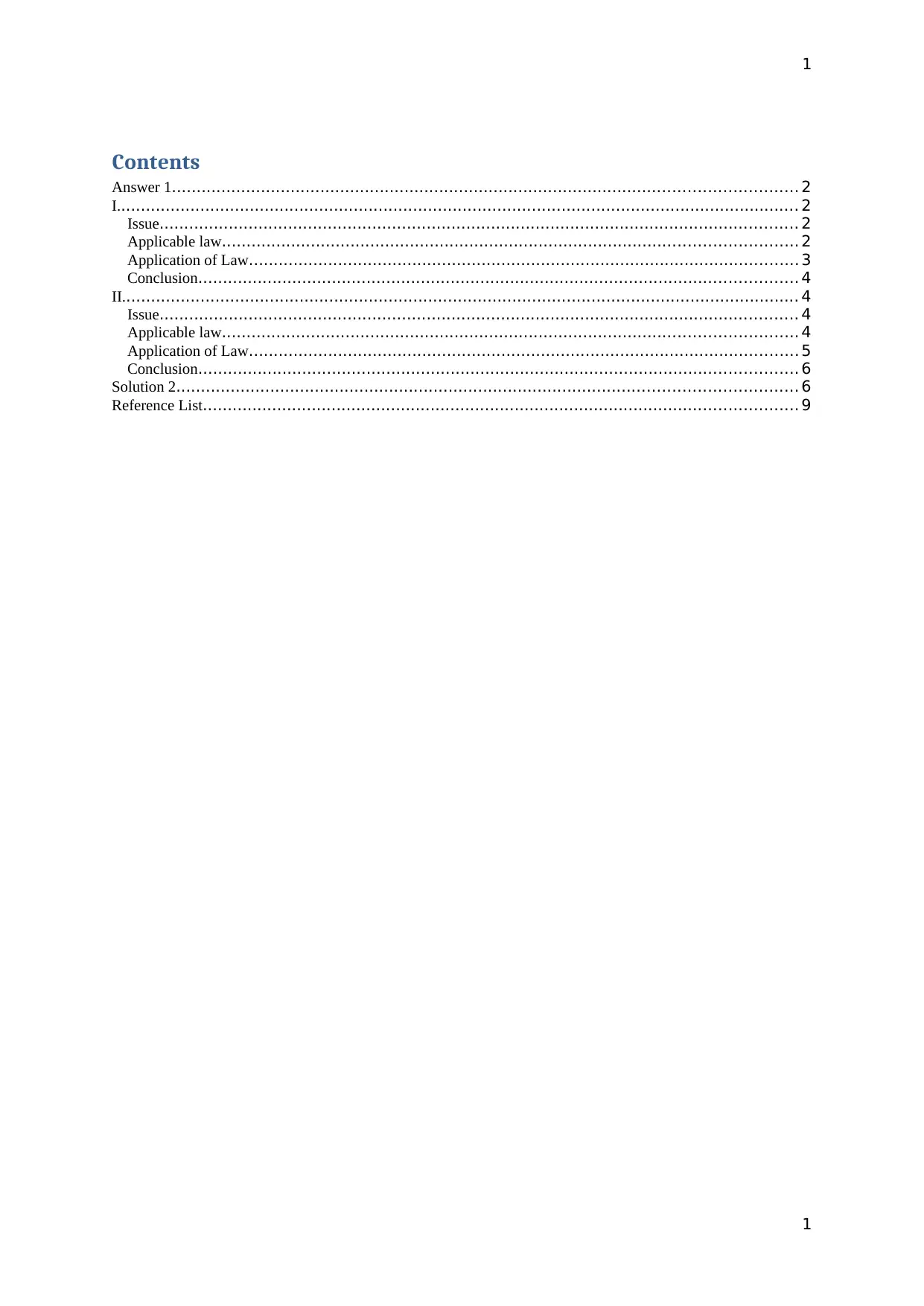
1
Contents
Answer 1.............................................................................................................................. 2
I.......................................................................................................................................... 2
Issue................................................................................................................................. 2
Applicable law.................................................................................................................... 2
Application of Law............................................................................................................... 3
Conclusion......................................................................................................................... 4
II......................................................................................................................................... 4
Issue................................................................................................................................. 4
Applicable law.................................................................................................................... 4
Application of Law............................................................................................................... 5
Conclusion......................................................................................................................... 6
Solution 2............................................................................................................................. 6
Reference List........................................................................................................................ 9
1
Contents
Answer 1.............................................................................................................................. 2
I.......................................................................................................................................... 2
Issue................................................................................................................................. 2
Applicable law.................................................................................................................... 2
Application of Law............................................................................................................... 3
Conclusion......................................................................................................................... 4
II......................................................................................................................................... 4
Issue................................................................................................................................. 4
Applicable law.................................................................................................................... 4
Application of Law............................................................................................................... 5
Conclusion......................................................................................................................... 6
Solution 2............................................................................................................................. 6
Reference List........................................................................................................................ 9
1
Paraphrase This Document
Need a fresh take? Get an instant paraphrase of this document with our AI Paraphraser
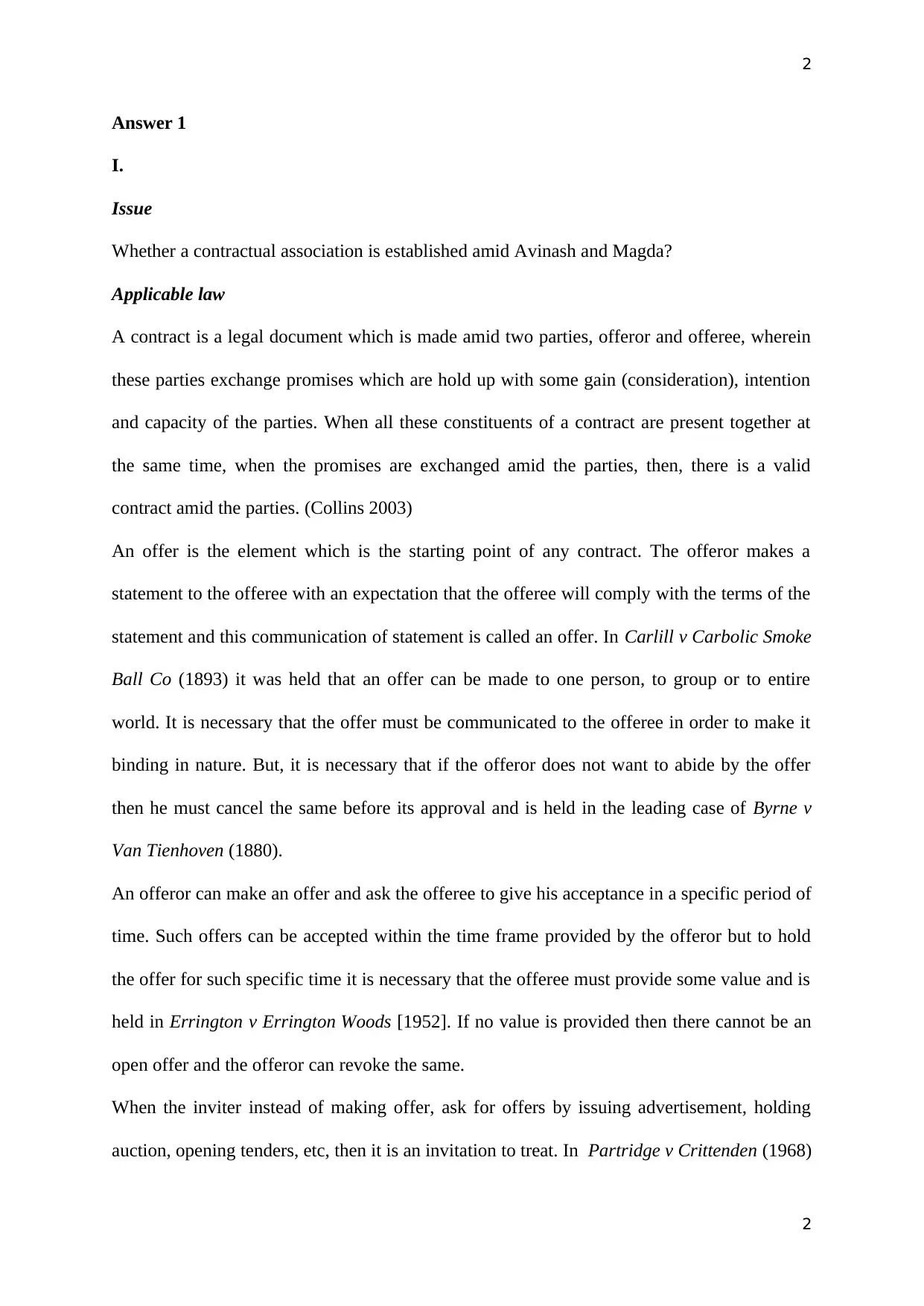
2
Answer 1
I.
Issue
Whether a contractual association is established amid Avinash and Magda?
Applicable law
A contract is a legal document which is made amid two parties, offeror and offeree, wherein
these parties exchange promises which are hold up with some gain (consideration), intention
and capacity of the parties. When all these constituents of a contract are present together at
the same time, when the promises are exchanged amid the parties, then, there is a valid
contract amid the parties. (Collins 2003)
An offer is the element which is the starting point of any contract. The offeror makes a
statement to the offeree with an expectation that the offeree will comply with the terms of the
statement and this communication of statement is called an offer. In Carlill v Carbolic Smoke
Ball Co (1893) it was held that an offer can be made to one person, to group or to entire
world. It is necessary that the offer must be communicated to the offeree in order to make it
binding in nature. But, it is necessary that if the offeror does not want to abide by the offer
then he must cancel the same before its approval and is held in the leading case of Byrne v
Van Tienhoven (1880).
An offeror can make an offer and ask the offeree to give his acceptance in a specific period of
time. Such offers can be accepted within the time frame provided by the offeror but to hold
the offer for such specific time it is necessary that the offeree must provide some value and is
held in Errington v Errington Woods [1952]. If no value is provided then there cannot be an
open offer and the offeror can revoke the same.
When the inviter instead of making offer, ask for offers by issuing advertisement, holding
auction, opening tenders, etc, then it is an invitation to treat. In Partridge v Crittenden (1968)
2
Answer 1
I.
Issue
Whether a contractual association is established amid Avinash and Magda?
Applicable law
A contract is a legal document which is made amid two parties, offeror and offeree, wherein
these parties exchange promises which are hold up with some gain (consideration), intention
and capacity of the parties. When all these constituents of a contract are present together at
the same time, when the promises are exchanged amid the parties, then, there is a valid
contract amid the parties. (Collins 2003)
An offer is the element which is the starting point of any contract. The offeror makes a
statement to the offeree with an expectation that the offeree will comply with the terms of the
statement and this communication of statement is called an offer. In Carlill v Carbolic Smoke
Ball Co (1893) it was held that an offer can be made to one person, to group or to entire
world. It is necessary that the offer must be communicated to the offeree in order to make it
binding in nature. But, it is necessary that if the offeror does not want to abide by the offer
then he must cancel the same before its approval and is held in the leading case of Byrne v
Van Tienhoven (1880).
An offeror can make an offer and ask the offeree to give his acceptance in a specific period of
time. Such offers can be accepted within the time frame provided by the offeror but to hold
the offer for such specific time it is necessary that the offeree must provide some value and is
held in Errington v Errington Woods [1952]. If no value is provided then there cannot be an
open offer and the offeror can revoke the same.
When the inviter instead of making offer, ask for offers by issuing advertisement, holding
auction, opening tenders, etc, then it is an invitation to treat. In Partridge v Crittenden (1968)
2
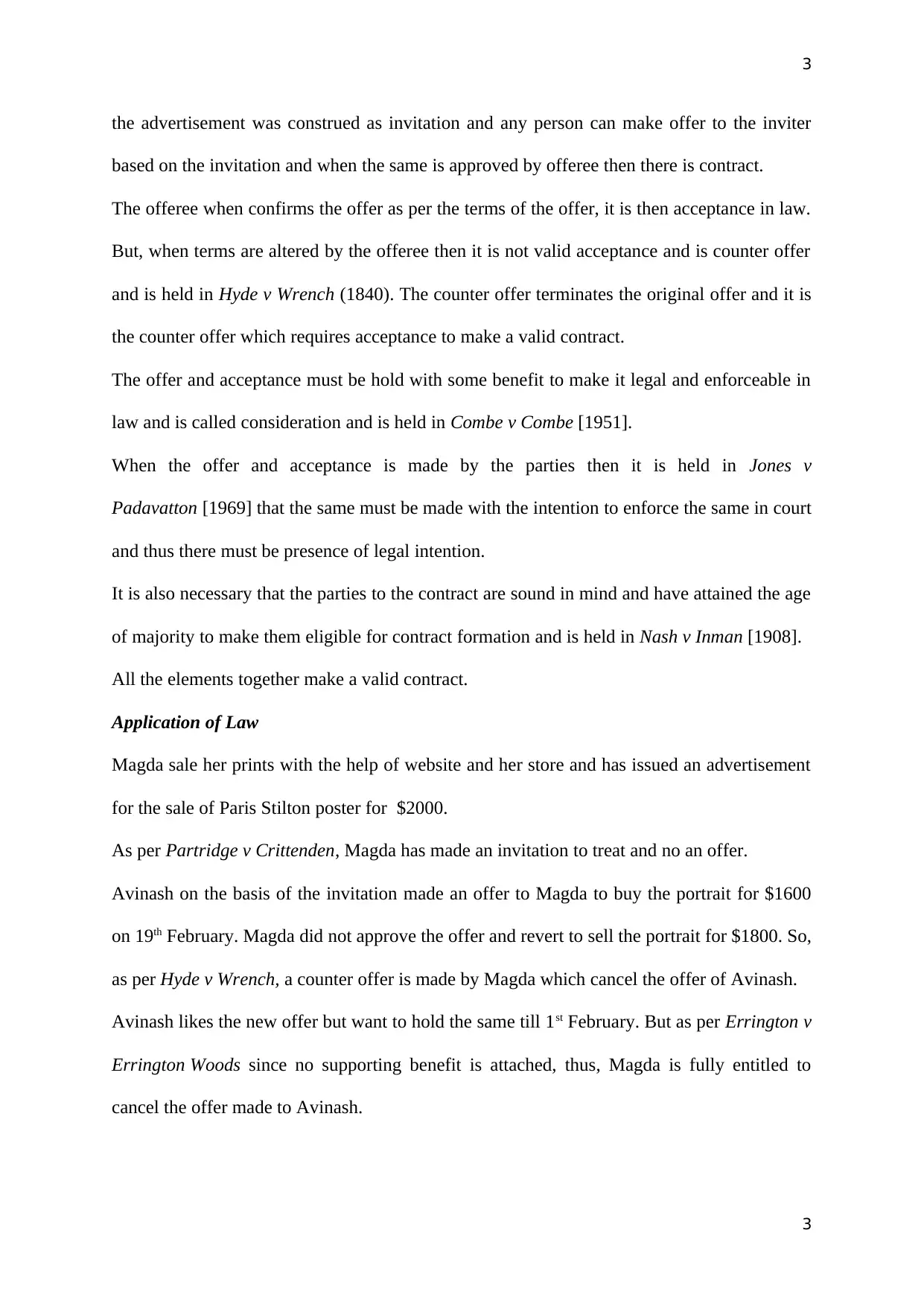
3
the advertisement was construed as invitation and any person can make offer to the inviter
based on the invitation and when the same is approved by offeree then there is contract.
The offeree when confirms the offer as per the terms of the offer, it is then acceptance in law.
But, when terms are altered by the offeree then it is not valid acceptance and is counter offer
and is held in Hyde v Wrench (1840). The counter offer terminates the original offer and it is
the counter offer which requires acceptance to make a valid contract.
The offer and acceptance must be hold with some benefit to make it legal and enforceable in
law and is called consideration and is held in Combe v Combe [1951].
When the offer and acceptance is made by the parties then it is held in Jones v
Padavatton [1969] that the same must be made with the intention to enforce the same in court
and thus there must be presence of legal intention.
It is also necessary that the parties to the contract are sound in mind and have attained the age
of majority to make them eligible for contract formation and is held in Nash v Inman [1908].
All the elements together make a valid contract.
Application of Law
Magda sale her prints with the help of website and her store and has issued an advertisement
for the sale of Paris Stilton poster for $2000.
As per Partridge v Crittenden, Magda has made an invitation to treat and no an offer.
Avinash on the basis of the invitation made an offer to Magda to buy the portrait for $1600
on 19th February. Magda did not approve the offer and revert to sell the portrait for $1800. So,
as per Hyde v Wrench, a counter offer is made by Magda which cancel the offer of Avinash.
Avinash likes the new offer but want to hold the same till 1st February. But as per Errington v
Errington Woods since no supporting benefit is attached, thus, Magda is fully entitled to
cancel the offer made to Avinash.
3
the advertisement was construed as invitation and any person can make offer to the inviter
based on the invitation and when the same is approved by offeree then there is contract.
The offeree when confirms the offer as per the terms of the offer, it is then acceptance in law.
But, when terms are altered by the offeree then it is not valid acceptance and is counter offer
and is held in Hyde v Wrench (1840). The counter offer terminates the original offer and it is
the counter offer which requires acceptance to make a valid contract.
The offer and acceptance must be hold with some benefit to make it legal and enforceable in
law and is called consideration and is held in Combe v Combe [1951].
When the offer and acceptance is made by the parties then it is held in Jones v
Padavatton [1969] that the same must be made with the intention to enforce the same in court
and thus there must be presence of legal intention.
It is also necessary that the parties to the contract are sound in mind and have attained the age
of majority to make them eligible for contract formation and is held in Nash v Inman [1908].
All the elements together make a valid contract.
Application of Law
Magda sale her prints with the help of website and her store and has issued an advertisement
for the sale of Paris Stilton poster for $2000.
As per Partridge v Crittenden, Magda has made an invitation to treat and no an offer.
Avinash on the basis of the invitation made an offer to Magda to buy the portrait for $1600
on 19th February. Magda did not approve the offer and revert to sell the portrait for $1800. So,
as per Hyde v Wrench, a counter offer is made by Magda which cancel the offer of Avinash.
Avinash likes the new offer but want to hold the same till 1st February. But as per Errington v
Errington Woods since no supporting benefit is attached, thus, Magda is fully entitled to
cancel the offer made to Avinash.
3
⊘ This is a preview!⊘
Do you want full access?
Subscribe today to unlock all pages.

Trusted by 1+ million students worldwide
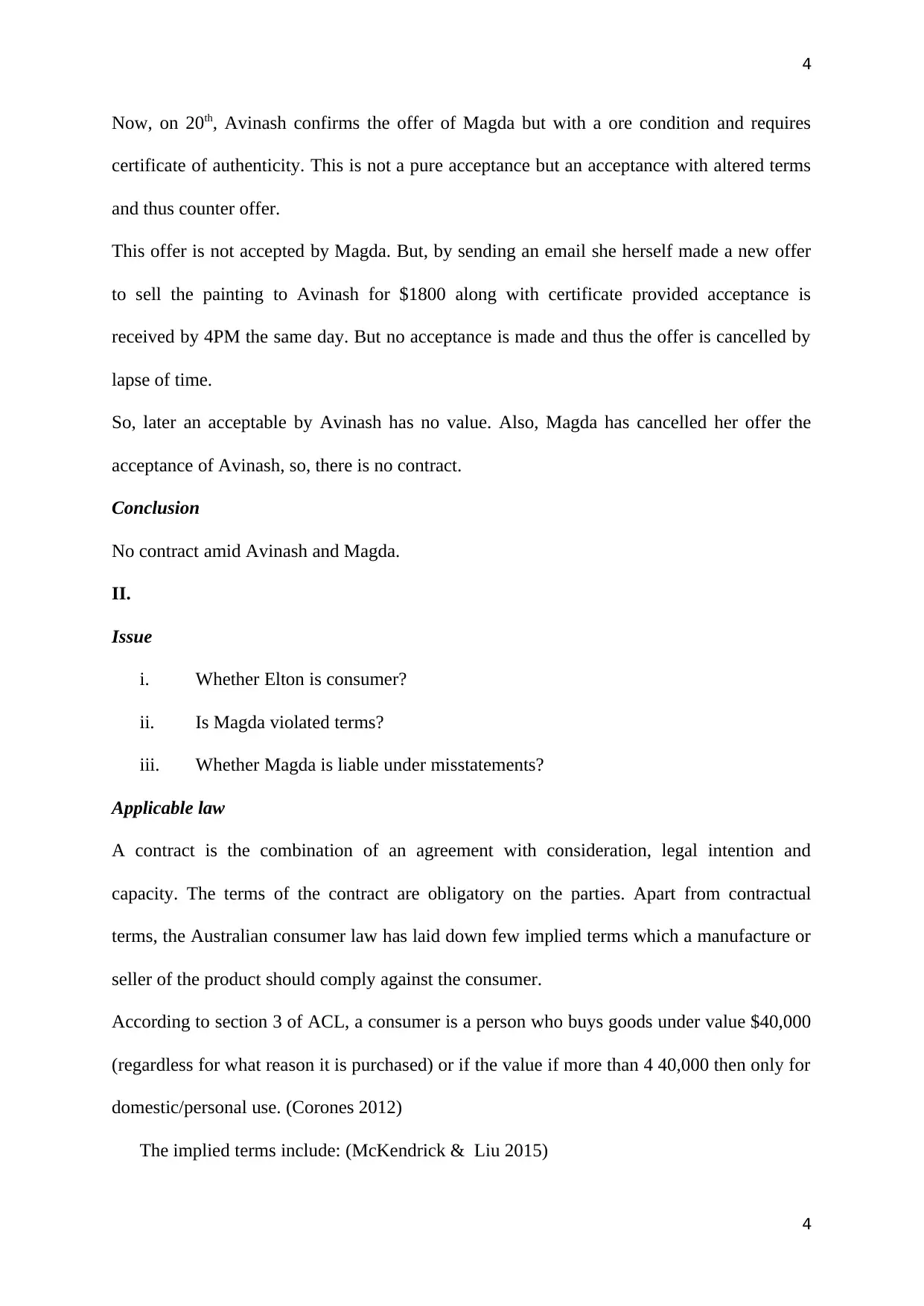
4
Now, on 20th, Avinash confirms the offer of Magda but with a ore condition and requires
certificate of authenticity. This is not a pure acceptance but an acceptance with altered terms
and thus counter offer.
This offer is not accepted by Magda. But, by sending an email she herself made a new offer
to sell the painting to Avinash for $1800 along with certificate provided acceptance is
received by 4PM the same day. But no acceptance is made and thus the offer is cancelled by
lapse of time.
So, later an acceptable by Avinash has no value. Also, Magda has cancelled her offer the
acceptance of Avinash, so, there is no contract.
Conclusion
No contract amid Avinash and Magda.
II.
Issue
i. Whether Elton is consumer?
ii. Is Magda violated terms?
iii. Whether Magda is liable under misstatements?
Applicable law
A contract is the combination of an agreement with consideration, legal intention and
capacity. The terms of the contract are obligatory on the parties. Apart from contractual
terms, the Australian consumer law has laid down few implied terms which a manufacture or
seller of the product should comply against the consumer.
According to section 3 of ACL, a consumer is a person who buys goods under value $40,000
(regardless for what reason it is purchased) or if the value if more than 4 40,000 then only for
domestic/personal use. (Corones 2012)
The implied terms include: (McKendrick & Liu 2015)
4
Now, on 20th, Avinash confirms the offer of Magda but with a ore condition and requires
certificate of authenticity. This is not a pure acceptance but an acceptance with altered terms
and thus counter offer.
This offer is not accepted by Magda. But, by sending an email she herself made a new offer
to sell the painting to Avinash for $1800 along with certificate provided acceptance is
received by 4PM the same day. But no acceptance is made and thus the offer is cancelled by
lapse of time.
So, later an acceptable by Avinash has no value. Also, Magda has cancelled her offer the
acceptance of Avinash, so, there is no contract.
Conclusion
No contract amid Avinash and Magda.
II.
Issue
i. Whether Elton is consumer?
ii. Is Magda violated terms?
iii. Whether Magda is liable under misstatements?
Applicable law
A contract is the combination of an agreement with consideration, legal intention and
capacity. The terms of the contract are obligatory on the parties. Apart from contractual
terms, the Australian consumer law has laid down few implied terms which a manufacture or
seller of the product should comply against the consumer.
According to section 3 of ACL, a consumer is a person who buys goods under value $40,000
(regardless for what reason it is purchased) or if the value if more than 4 40,000 then only for
domestic/personal use. (Corones 2012)
The implied terms include: (McKendrick & Liu 2015)
4
Paraphrase This Document
Need a fresh take? Get an instant paraphrase of this document with our AI Paraphraser
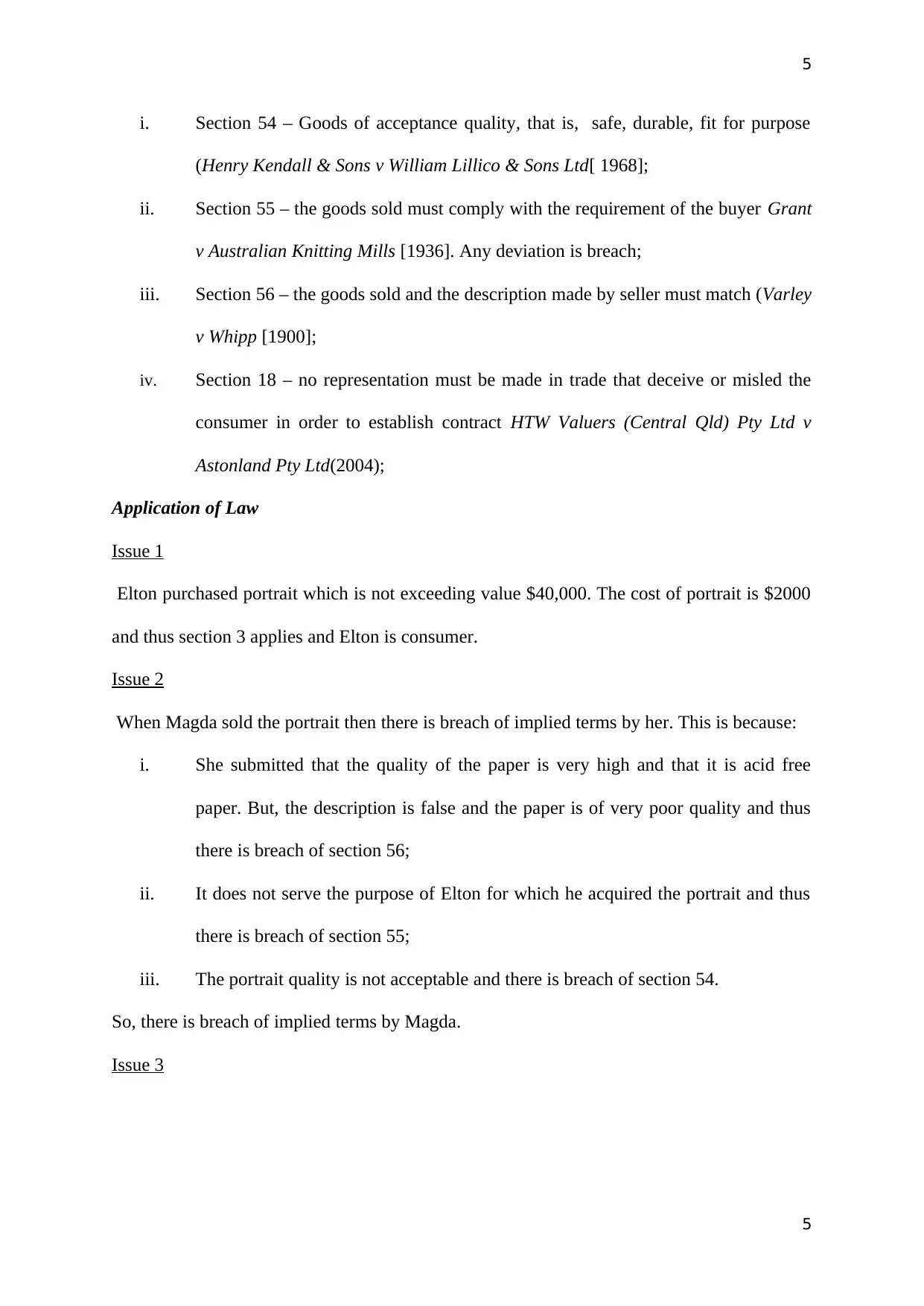
5
i. Section 54 – Goods of acceptance quality, that is, safe, durable, fit for purpose
(Henry Kendall & Sons v William Lillico & Sons Ltd[ 1968];
ii. Section 55 – the goods sold must comply with the requirement of the buyer Grant
v Australian Knitting Mills [1936]. Any deviation is breach;
iii. Section 56 – the goods sold and the description made by seller must match (Varley
v Whipp [1900];
iv. Section 18 – no representation must be made in trade that deceive or misled the
consumer in order to establish contract HTW Valuers (Central Qld) Pty Ltd v
Astonland Pty Ltd(2004);
Application of Law
Issue 1
Elton purchased portrait which is not exceeding value $40,000. The cost of portrait is $2000
and thus section 3 applies and Elton is consumer.
Issue 2
When Magda sold the portrait then there is breach of implied terms by her. This is because:
i. She submitted that the quality of the paper is very high and that it is acid free
paper. But, the description is false and the paper is of very poor quality and thus
there is breach of section 56;
ii. It does not serve the purpose of Elton for which he acquired the portrait and thus
there is breach of section 55;
iii. The portrait quality is not acceptable and there is breach of section 54.
So, there is breach of implied terms by Magda.
Issue 3
5
i. Section 54 – Goods of acceptance quality, that is, safe, durable, fit for purpose
(Henry Kendall & Sons v William Lillico & Sons Ltd[ 1968];
ii. Section 55 – the goods sold must comply with the requirement of the buyer Grant
v Australian Knitting Mills [1936]. Any deviation is breach;
iii. Section 56 – the goods sold and the description made by seller must match (Varley
v Whipp [1900];
iv. Section 18 – no representation must be made in trade that deceive or misled the
consumer in order to establish contract HTW Valuers (Central Qld) Pty Ltd v
Astonland Pty Ltd(2004);
Application of Law
Issue 1
Elton purchased portrait which is not exceeding value $40,000. The cost of portrait is $2000
and thus section 3 applies and Elton is consumer.
Issue 2
When Magda sold the portrait then there is breach of implied terms by her. This is because:
i. She submitted that the quality of the paper is very high and that it is acid free
paper. But, the description is false and the paper is of very poor quality and thus
there is breach of section 56;
ii. It does not serve the purpose of Elton for which he acquired the portrait and thus
there is breach of section 55;
iii. The portrait quality is not acceptable and there is breach of section 54.
So, there is breach of implied terms by Magda.
Issue 3
5
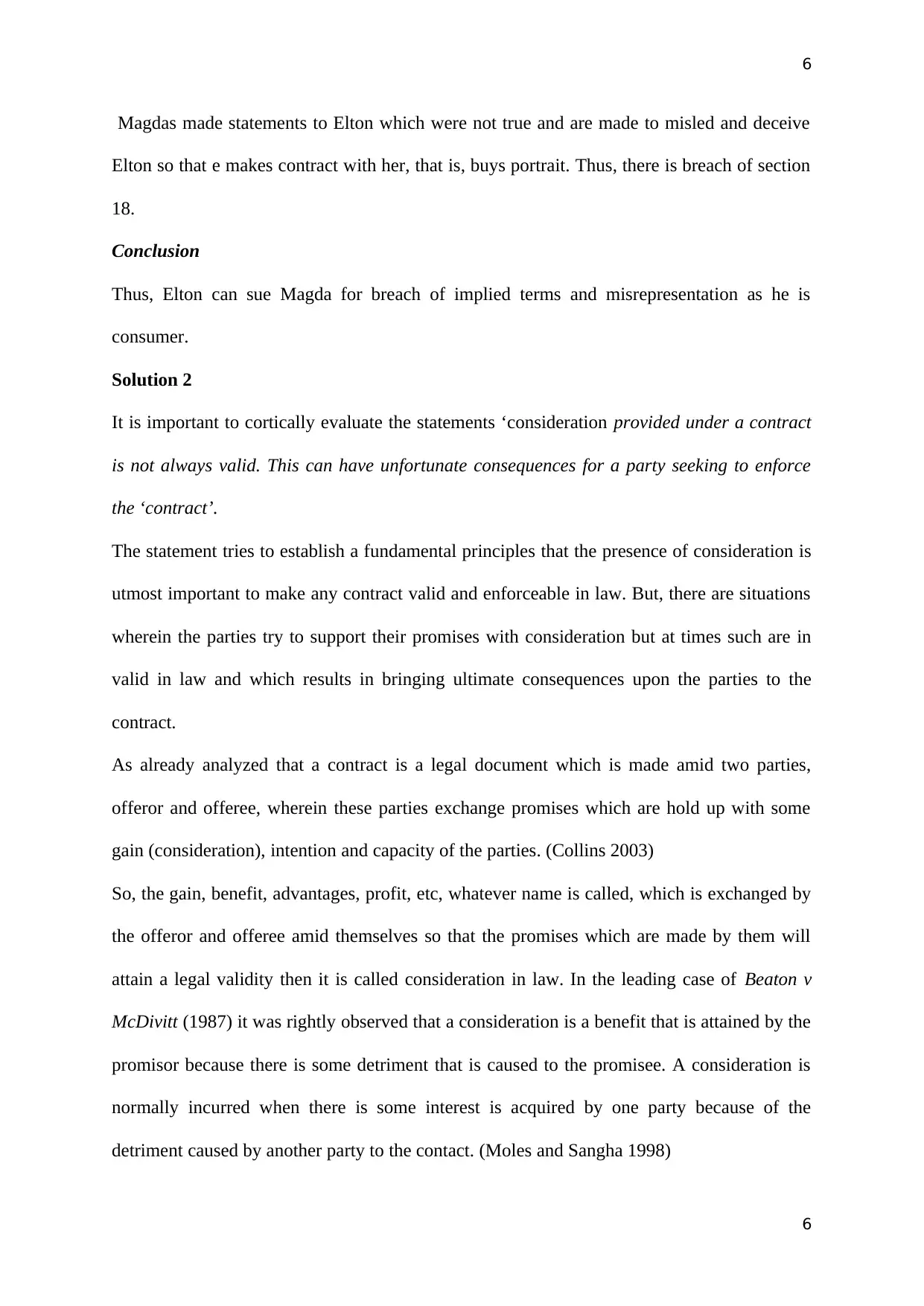
6
Magdas made statements to Elton which were not true and are made to misled and deceive
Elton so that e makes contract with her, that is, buys portrait. Thus, there is breach of section
18.
Conclusion
Thus, Elton can sue Magda for breach of implied terms and misrepresentation as he is
consumer.
Solution 2
It is important to cortically evaluate the statements ‘consideration provided under a contract
is not always valid. This can have unfortunate consequences for a party seeking to enforce
the ‘contract’.
The statement tries to establish a fundamental principles that the presence of consideration is
utmost important to make any contract valid and enforceable in law. But, there are situations
wherein the parties try to support their promises with consideration but at times such are in
valid in law and which results in bringing ultimate consequences upon the parties to the
contract.
As already analyzed that a contract is a legal document which is made amid two parties,
offeror and offeree, wherein these parties exchange promises which are hold up with some
gain (consideration), intention and capacity of the parties. (Collins 2003)
So, the gain, benefit, advantages, profit, etc, whatever name is called, which is exchanged by
the offeror and offeree amid themselves so that the promises which are made by them will
attain a legal validity then it is called consideration in law. In the leading case of Beaton v
McDivitt (1987) it was rightly observed that a consideration is a benefit that is attained by the
promisor because there is some detriment that is caused to the promisee. A consideration is
normally incurred when there is some interest is acquired by one party because of the
detriment caused by another party to the contact. (Moles and Sangha 1998)
6
Magdas made statements to Elton which were not true and are made to misled and deceive
Elton so that e makes contract with her, that is, buys portrait. Thus, there is breach of section
18.
Conclusion
Thus, Elton can sue Magda for breach of implied terms and misrepresentation as he is
consumer.
Solution 2
It is important to cortically evaluate the statements ‘consideration provided under a contract
is not always valid. This can have unfortunate consequences for a party seeking to enforce
the ‘contract’.
The statement tries to establish a fundamental principles that the presence of consideration is
utmost important to make any contract valid and enforceable in law. But, there are situations
wherein the parties try to support their promises with consideration but at times such are in
valid in law and which results in bringing ultimate consequences upon the parties to the
contract.
As already analyzed that a contract is a legal document which is made amid two parties,
offeror and offeree, wherein these parties exchange promises which are hold up with some
gain (consideration), intention and capacity of the parties. (Collins 2003)
So, the gain, benefit, advantages, profit, etc, whatever name is called, which is exchanged by
the offeror and offeree amid themselves so that the promises which are made by them will
attain a legal validity then it is called consideration in law. In the leading case of Beaton v
McDivitt (1987) it was rightly observed that a consideration is a benefit that is attained by the
promisor because there is some detriment that is caused to the promisee. A consideration is
normally incurred when there is some interest is acquired by one party because of the
detriment caused by another party to the contact. (Moles and Sangha 1998)
6
⊘ This is a preview!⊘
Do you want full access?
Subscribe today to unlock all pages.

Trusted by 1+ million students worldwide
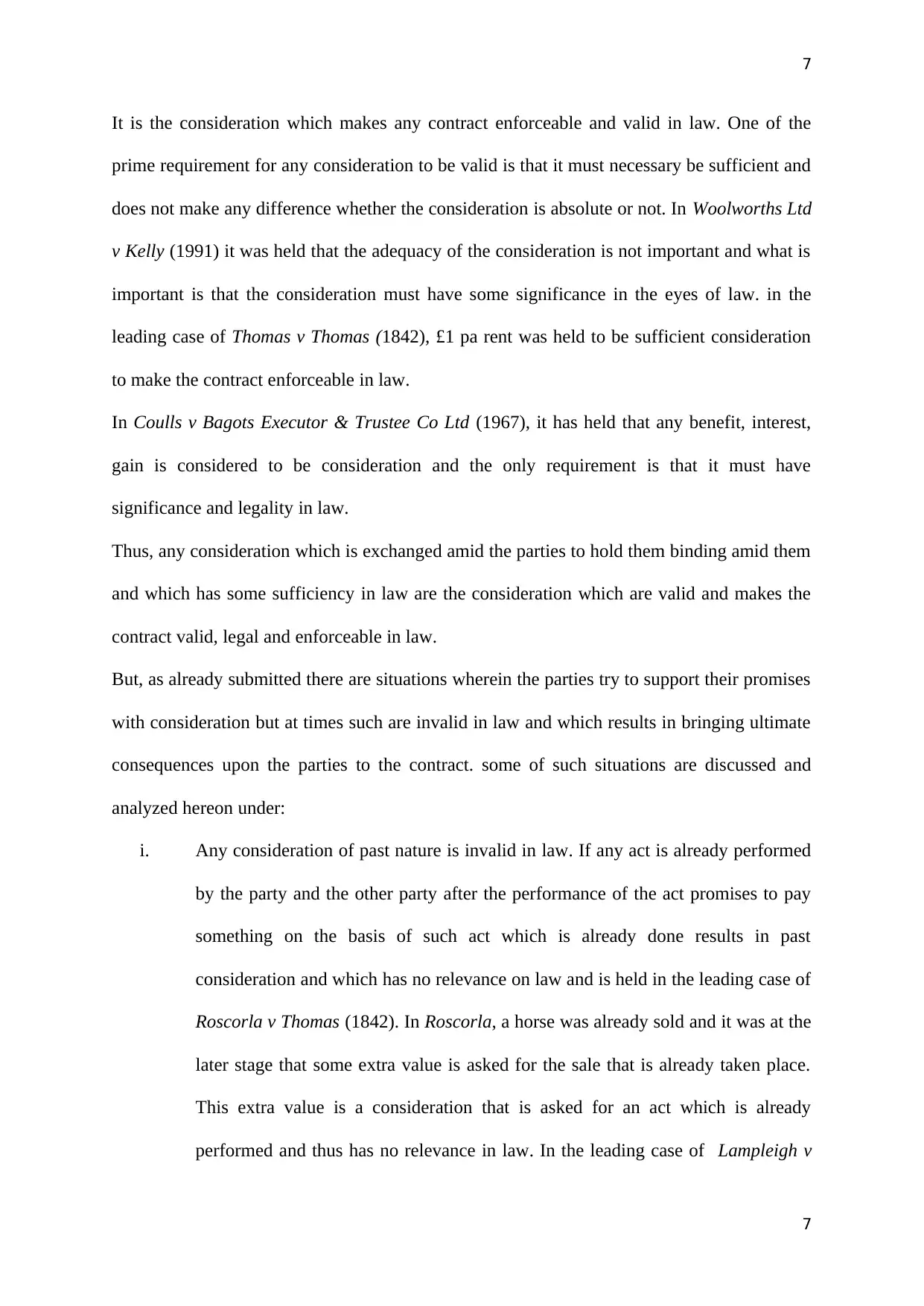
7
It is the consideration which makes any contract enforceable and valid in law. One of the
prime requirement for any consideration to be valid is that it must necessary be sufficient and
does not make any difference whether the consideration is absolute or not. In Woolworths Ltd
v Kelly (1991) it was held that the adequacy of the consideration is not important and what is
important is that the consideration must have some significance in the eyes of law. in the
leading case of Thomas v Thomas (1842), £1 pa rent was held to be sufficient consideration
to make the contract enforceable in law.
In Coulls v Bagots Executor & Trustee Co Ltd (1967), it has held that any benefit, interest,
gain is considered to be consideration and the only requirement is that it must have
significance and legality in law.
Thus, any consideration which is exchanged amid the parties to hold them binding amid them
and which has some sufficiency in law are the consideration which are valid and makes the
contract valid, legal and enforceable in law.
But, as already submitted there are situations wherein the parties try to support their promises
with consideration but at times such are invalid in law and which results in bringing ultimate
consequences upon the parties to the contract. some of such situations are discussed and
analyzed hereon under:
i. Any consideration of past nature is invalid in law. If any act is already performed
by the party and the other party after the performance of the act promises to pay
something on the basis of such act which is already done results in past
consideration and which has no relevance on law and is held in the leading case of
Roscorla v Thomas (1842). In Roscorla, a horse was already sold and it was at the
later stage that some extra value is asked for the sale that is already taken place.
This extra value is a consideration that is asked for an act which is already
performed and thus has no relevance in law. In the leading case of Lampleigh v
7
It is the consideration which makes any contract enforceable and valid in law. One of the
prime requirement for any consideration to be valid is that it must necessary be sufficient and
does not make any difference whether the consideration is absolute or not. In Woolworths Ltd
v Kelly (1991) it was held that the adequacy of the consideration is not important and what is
important is that the consideration must have some significance in the eyes of law. in the
leading case of Thomas v Thomas (1842), £1 pa rent was held to be sufficient consideration
to make the contract enforceable in law.
In Coulls v Bagots Executor & Trustee Co Ltd (1967), it has held that any benefit, interest,
gain is considered to be consideration and the only requirement is that it must have
significance and legality in law.
Thus, any consideration which is exchanged amid the parties to hold them binding amid them
and which has some sufficiency in law are the consideration which are valid and makes the
contract valid, legal and enforceable in law.
But, as already submitted there are situations wherein the parties try to support their promises
with consideration but at times such are invalid in law and which results in bringing ultimate
consequences upon the parties to the contract. some of such situations are discussed and
analyzed hereon under:
i. Any consideration of past nature is invalid in law. If any act is already performed
by the party and the other party after the performance of the act promises to pay
something on the basis of such act which is already done results in past
consideration and which has no relevance on law and is held in the leading case of
Roscorla v Thomas (1842). In Roscorla, a horse was already sold and it was at the
later stage that some extra value is asked for the sale that is already taken place.
This extra value is a consideration that is asked for an act which is already
performed and thus has no relevance in law. In the leading case of Lampleigh v
7
Paraphrase This Document
Need a fresh take? Get an instant paraphrase of this document with our AI Paraphraser
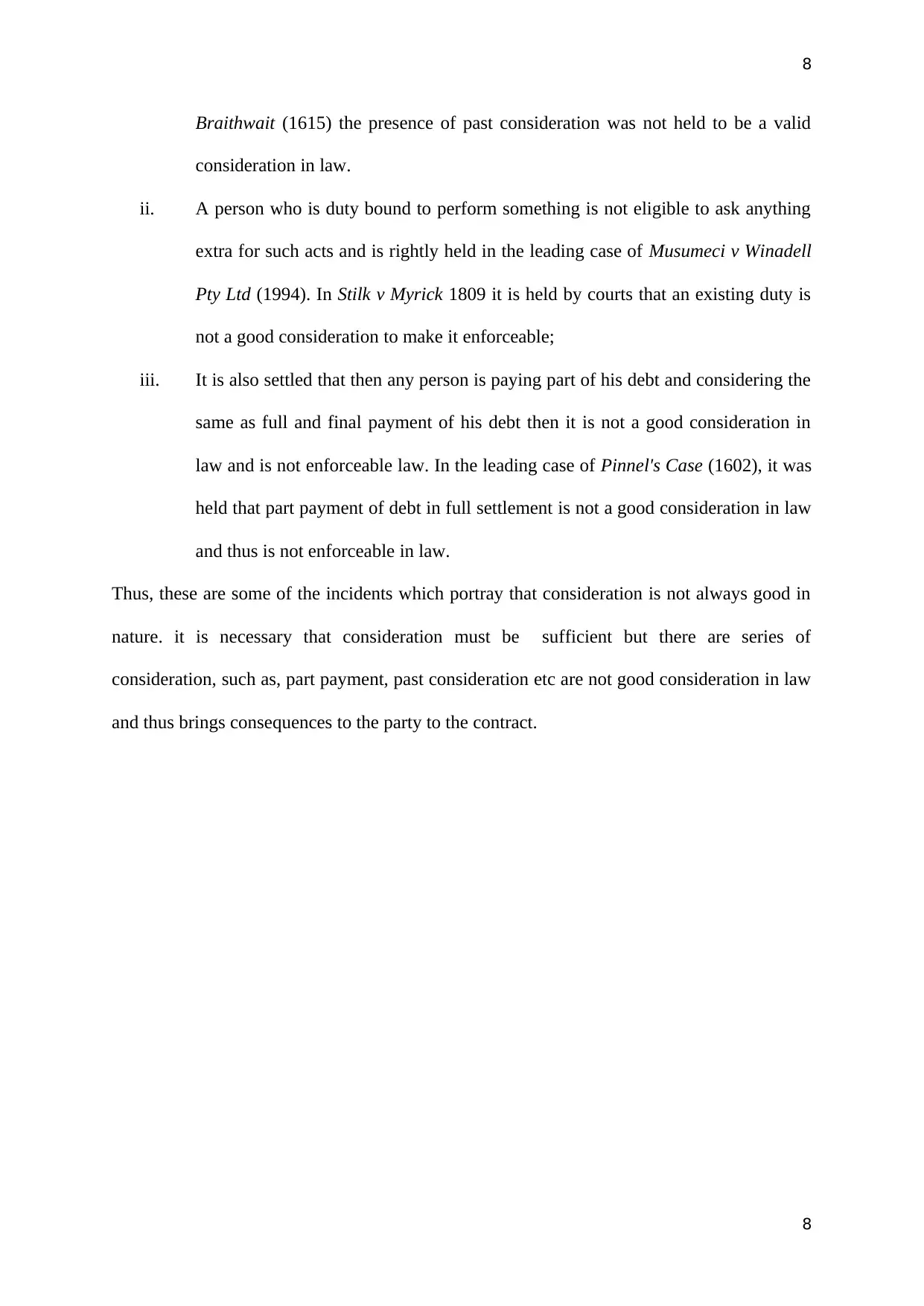
8
Braithwait (1615) the presence of past consideration was not held to be a valid
consideration in law.
ii. A person who is duty bound to perform something is not eligible to ask anything
extra for such acts and is rightly held in the leading case of Musumeci v Winadell
Pty Ltd (1994). In Stilk v Myrick 1809 it is held by courts that an existing duty is
not a good consideration to make it enforceable;
iii. It is also settled that then any person is paying part of his debt and considering the
same as full and final payment of his debt then it is not a good consideration in
law and is not enforceable law. In the leading case of Pinnel's Case (1602), it was
held that part payment of debt in full settlement is not a good consideration in law
and thus is not enforceable in law.
Thus, these are some of the incidents which portray that consideration is not always good in
nature. it is necessary that consideration must be sufficient but there are series of
consideration, such as, part payment, past consideration etc are not good consideration in law
and thus brings consequences to the party to the contract.
8
Braithwait (1615) the presence of past consideration was not held to be a valid
consideration in law.
ii. A person who is duty bound to perform something is not eligible to ask anything
extra for such acts and is rightly held in the leading case of Musumeci v Winadell
Pty Ltd (1994). In Stilk v Myrick 1809 it is held by courts that an existing duty is
not a good consideration to make it enforceable;
iii. It is also settled that then any person is paying part of his debt and considering the
same as full and final payment of his debt then it is not a good consideration in
law and is not enforceable law. In the leading case of Pinnel's Case (1602), it was
held that part payment of debt in full settlement is not a good consideration in law
and thus is not enforceable in law.
Thus, these are some of the incidents which portray that consideration is not always good in
nature. it is necessary that consideration must be sufficient but there are series of
consideration, such as, part payment, past consideration etc are not good consideration in law
and thus brings consequences to the party to the contract.
8
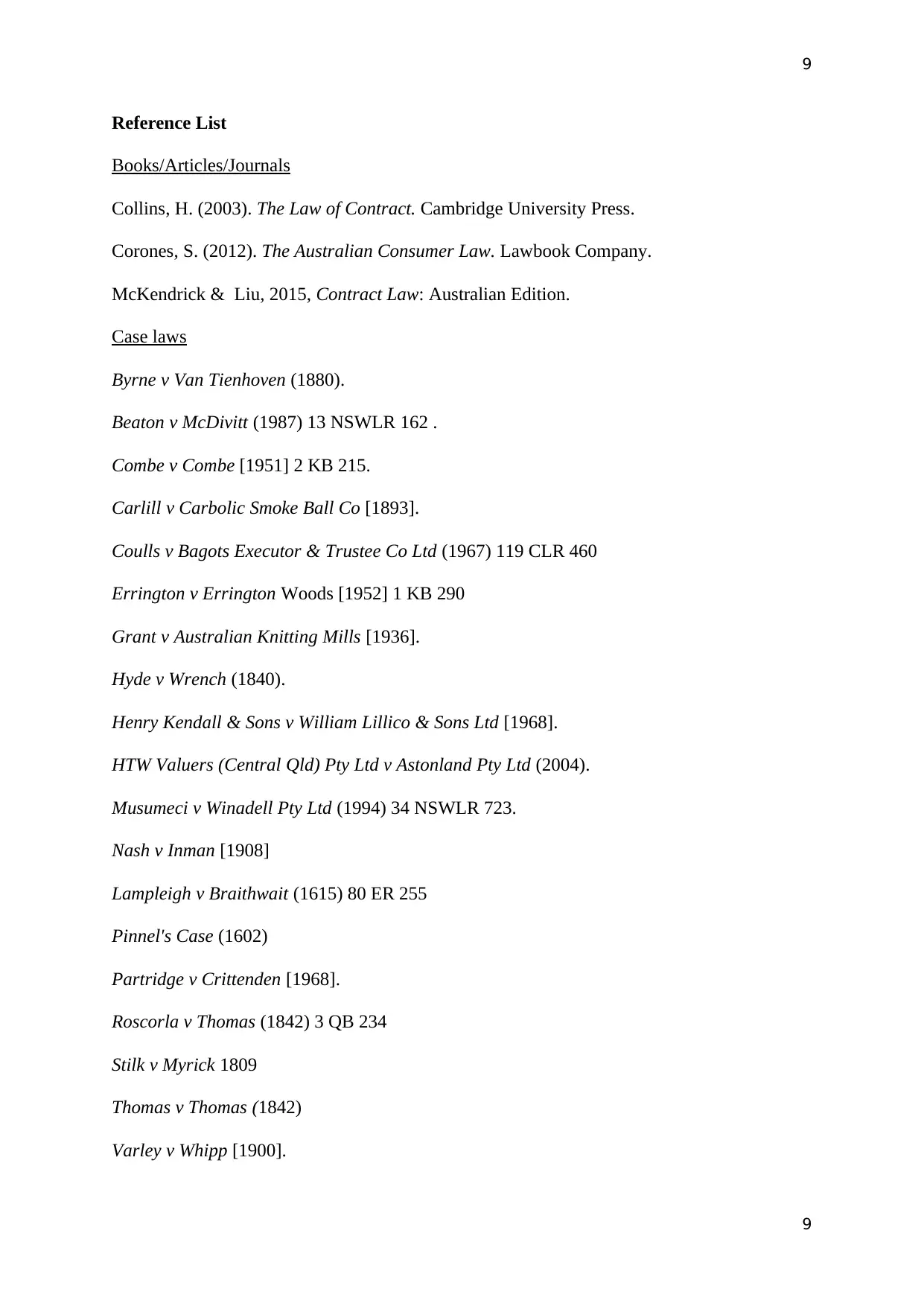
9
Reference List
Books/Articles/Journals
Collins, H. (2003). The Law of Contract. Cambridge University Press.
Corones, S. (2012). The Australian Consumer Law. Lawbook Company.
McKendrick & Liu, 2015, Contract Law: Australian Edition.
Case laws
Byrne v Van Tienhoven (1880).
Beaton v McDivitt (1987) 13 NSWLR 162 .
Combe v Combe [1951] 2 KB 215.
Carlill v Carbolic Smoke Ball Co [1893].
Coulls v Bagots Executor & Trustee Co Ltd (1967) 119 CLR 460
Errington v Errington Woods [1952] 1 KB 290
Grant v Australian Knitting Mills [1936].
Hyde v Wrench (1840).
Henry Kendall & Sons v William Lillico & Sons Ltd [1968].
HTW Valuers (Central Qld) Pty Ltd v Astonland Pty Ltd (2004).
Musumeci v Winadell Pty Ltd (1994) 34 NSWLR 723.
Nash v Inman [1908]
Lampleigh v Braithwait (1615) 80 ER 255
Pinnel's Case (1602)
Partridge v Crittenden [1968].
Roscorla v Thomas (1842) 3 QB 234
Stilk v Myrick 1809
Thomas v Thomas (1842)
Varley v Whipp [1900].
9
Reference List
Books/Articles/Journals
Collins, H. (2003). The Law of Contract. Cambridge University Press.
Corones, S. (2012). The Australian Consumer Law. Lawbook Company.
McKendrick & Liu, 2015, Contract Law: Australian Edition.
Case laws
Byrne v Van Tienhoven (1880).
Beaton v McDivitt (1987) 13 NSWLR 162 .
Combe v Combe [1951] 2 KB 215.
Carlill v Carbolic Smoke Ball Co [1893].
Coulls v Bagots Executor & Trustee Co Ltd (1967) 119 CLR 460
Errington v Errington Woods [1952] 1 KB 290
Grant v Australian Knitting Mills [1936].
Hyde v Wrench (1840).
Henry Kendall & Sons v William Lillico & Sons Ltd [1968].
HTW Valuers (Central Qld) Pty Ltd v Astonland Pty Ltd (2004).
Musumeci v Winadell Pty Ltd (1994) 34 NSWLR 723.
Nash v Inman [1908]
Lampleigh v Braithwait (1615) 80 ER 255
Pinnel's Case (1602)
Partridge v Crittenden [1968].
Roscorla v Thomas (1842) 3 QB 234
Stilk v Myrick 1809
Thomas v Thomas (1842)
Varley v Whipp [1900].
9
⊘ This is a preview!⊘
Do you want full access?
Subscribe today to unlock all pages.

Trusted by 1+ million students worldwide
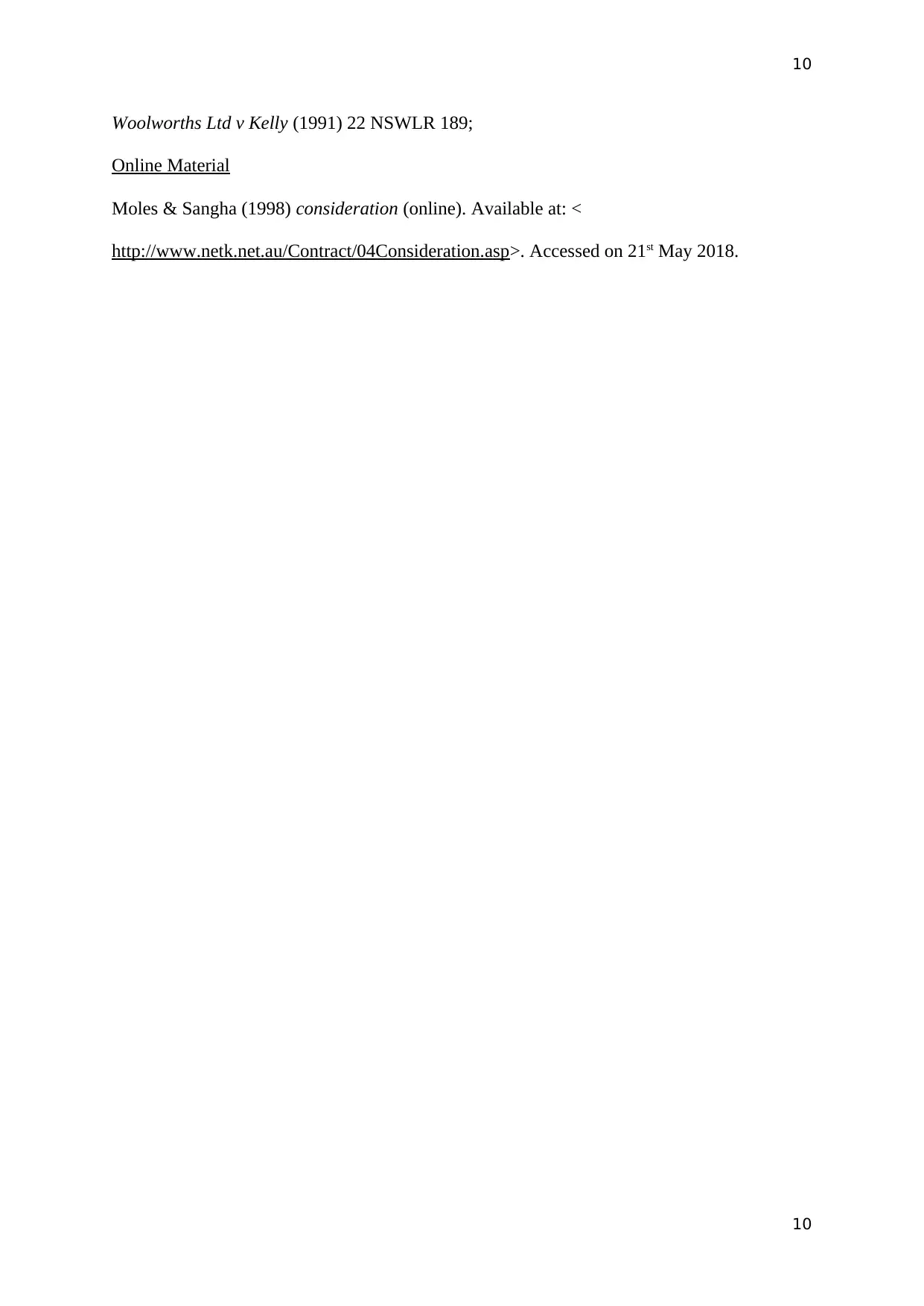
10
Woolworths Ltd v Kelly (1991) 22 NSWLR 189;
Online Material
Moles & Sangha (1998) consideration (online). Available at: <
http://www.netk.net.au/Contract/04Consideration.asp>. Accessed on 21st May 2018.
10
Woolworths Ltd v Kelly (1991) 22 NSWLR 189;
Online Material
Moles & Sangha (1998) consideration (online). Available at: <
http://www.netk.net.au/Contract/04Consideration.asp>. Accessed on 21st May 2018.
10
Paraphrase This Document
Need a fresh take? Get an instant paraphrase of this document with our AI Paraphraser
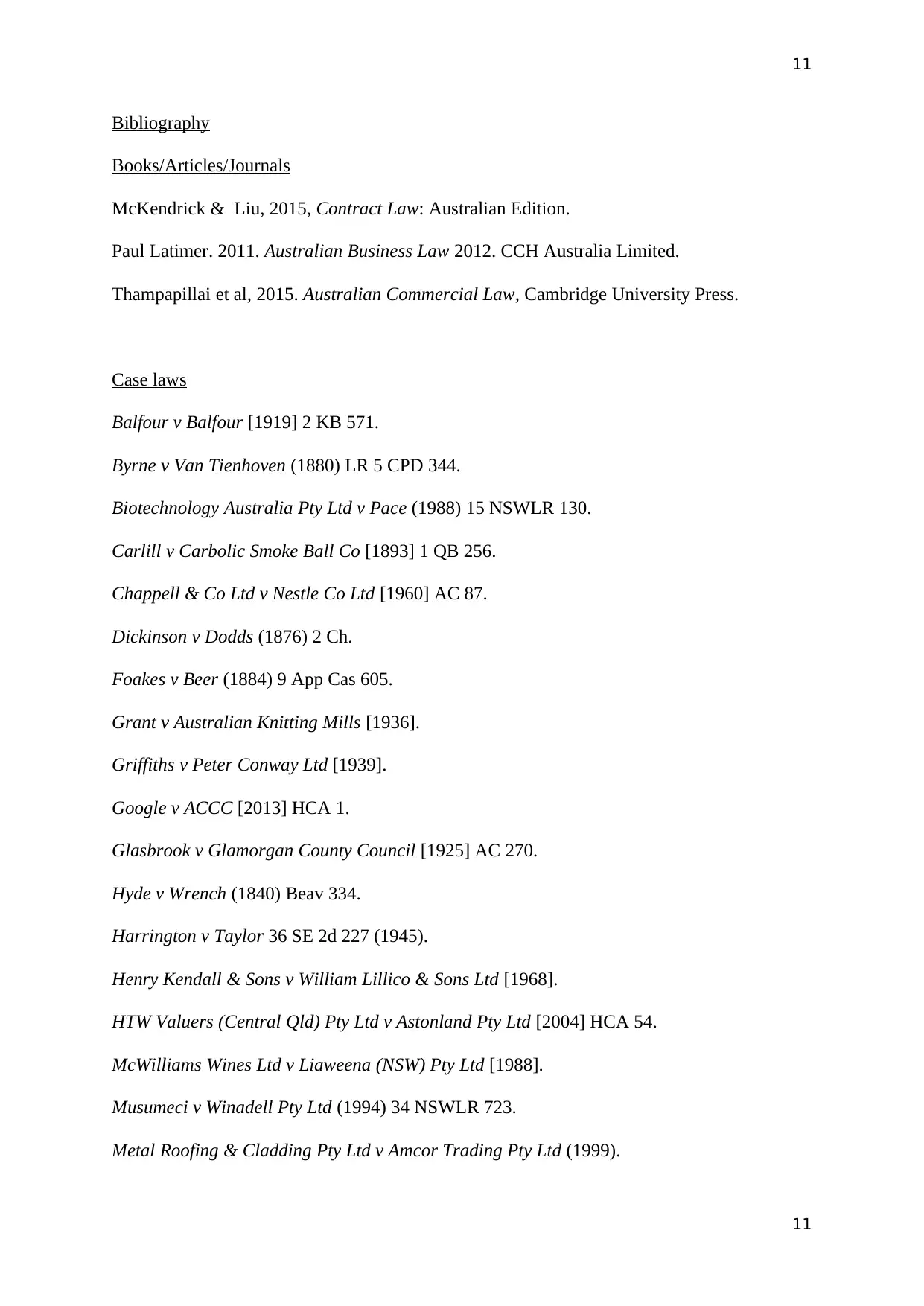
11
Bibliography
Books/Articles/Journals
McKendrick & Liu, 2015, Contract Law: Australian Edition.
Paul Latimer. 2011. Australian Business Law 2012. CCH Australia Limited.
Thampapillai et al, 2015. Australian Commercial Law, Cambridge University Press.
Case laws
Balfour v Balfour [1919] 2 KB 571.
Byrne v Van Tienhoven (1880) LR 5 CPD 344.
Biotechnology Australia Pty Ltd v Pace (1988) 15 NSWLR 130.
Carlill v Carbolic Smoke Ball Co [1893] 1 QB 256.
Chappell & Co Ltd v Nestle Co Ltd [1960] AC 87.
Dickinson v Dodds (1876) 2 Ch.
Foakes v Beer (1884) 9 App Cas 605.
Grant v Australian Knitting Mills [1936].
Griffiths v Peter Conway Ltd [1939].
Google v ACCC [2013] HCA 1.
Glasbrook v Glamorgan County Council [1925] AC 270.
Hyde v Wrench (1840) Beav 334.
Harrington v Taylor 36 SE 2d 227 (1945).
Henry Kendall & Sons v William Lillico & Sons Ltd [1968].
HTW Valuers (Central Qld) Pty Ltd v Astonland Pty Ltd [2004] HCA 54.
McWilliams Wines Ltd v Liaweena (NSW) Pty Ltd [1988].
Musumeci v Winadell Pty Ltd (1994) 34 NSWLR 723.
Metal Roofing & Cladding Pty Ltd v Amcor Trading Pty Ltd (1999).
11
Bibliography
Books/Articles/Journals
McKendrick & Liu, 2015, Contract Law: Australian Edition.
Paul Latimer. 2011. Australian Business Law 2012. CCH Australia Limited.
Thampapillai et al, 2015. Australian Commercial Law, Cambridge University Press.
Case laws
Balfour v Balfour [1919] 2 KB 571.
Byrne v Van Tienhoven (1880) LR 5 CPD 344.
Biotechnology Australia Pty Ltd v Pace (1988) 15 NSWLR 130.
Carlill v Carbolic Smoke Ball Co [1893] 1 QB 256.
Chappell & Co Ltd v Nestle Co Ltd [1960] AC 87.
Dickinson v Dodds (1876) 2 Ch.
Foakes v Beer (1884) 9 App Cas 605.
Grant v Australian Knitting Mills [1936].
Griffiths v Peter Conway Ltd [1939].
Google v ACCC [2013] HCA 1.
Glasbrook v Glamorgan County Council [1925] AC 270.
Hyde v Wrench (1840) Beav 334.
Harrington v Taylor 36 SE 2d 227 (1945).
Henry Kendall & Sons v William Lillico & Sons Ltd [1968].
HTW Valuers (Central Qld) Pty Ltd v Astonland Pty Ltd [2004] HCA 54.
McWilliams Wines Ltd v Liaweena (NSW) Pty Ltd [1988].
Musumeci v Winadell Pty Ltd (1994) 34 NSWLR 723.
Metal Roofing & Cladding Pty Ltd v Amcor Trading Pty Ltd (1999).
11
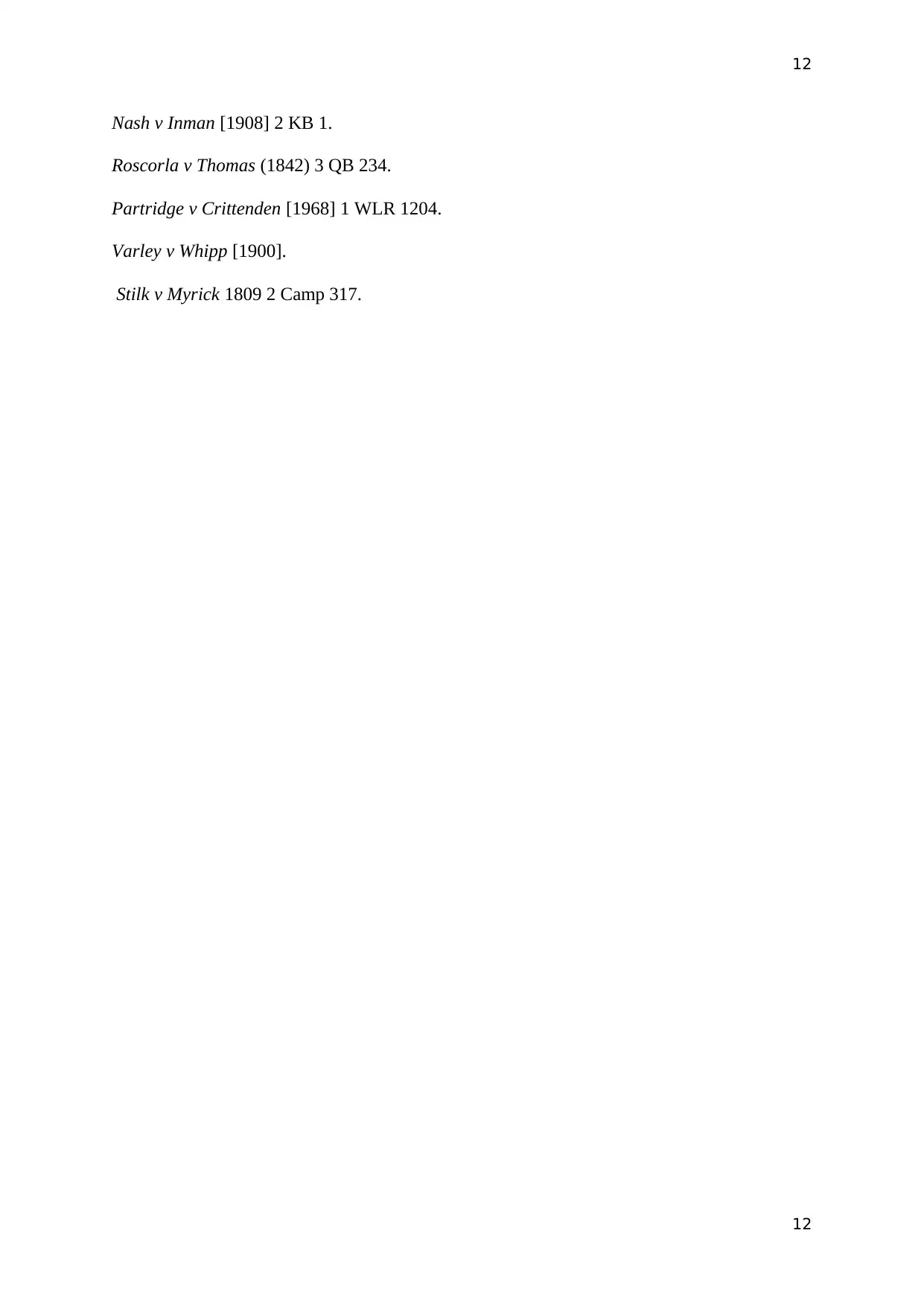
12
Nash v Inman [1908] 2 KB 1.
Roscorla v Thomas (1842) 3 QB 234.
Partridge v Crittenden [1968] 1 WLR 1204.
Varley v Whipp [1900].
Stilk v Myrick 1809 2 Camp 317.
12
Nash v Inman [1908] 2 KB 1.
Roscorla v Thomas (1842) 3 QB 234.
Partridge v Crittenden [1968] 1 WLR 1204.
Varley v Whipp [1900].
Stilk v Myrick 1809 2 Camp 317.
12
⊘ This is a preview!⊘
Do you want full access?
Subscribe today to unlock all pages.

Trusted by 1+ million students worldwide
1 out of 12
Related Documents
Your All-in-One AI-Powered Toolkit for Academic Success.
+13062052269
info@desklib.com
Available 24*7 on WhatsApp / Email
![[object Object]](/_next/static/media/star-bottom.7253800d.svg)
Unlock your academic potential
Copyright © 2020–2026 A2Z Services. All Rights Reserved. Developed and managed by ZUCOL.




